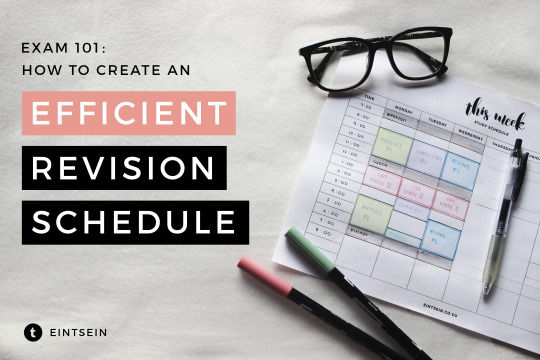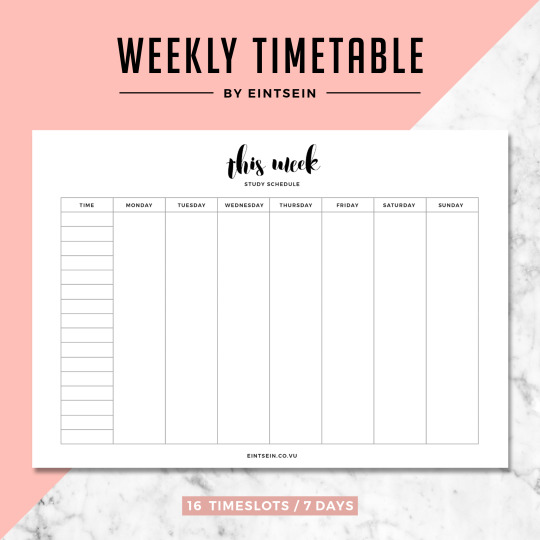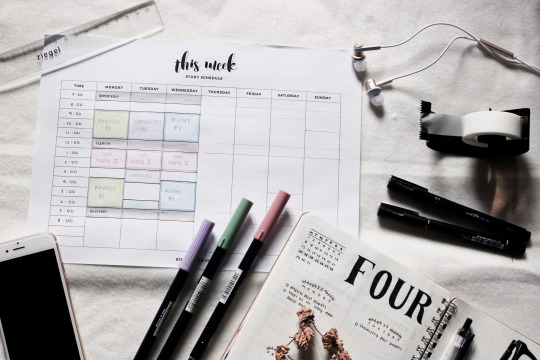Law Student 🔹 23 Years 🔹 Belgium 🔹In love with makeup 🔹 | Libertà | 🇧🇪🇮🇹 🔹 Owner of a Fiat 500 🚗❤️
Don't wanna be here? Send us removal request.
Photo

To be honest, I’m not the type of person to follow a strict schedule and have their entire day together. However, scheduling has allowed me to maximize my time and have more productive revision sessions. Aside from compelling you to actually start studying, scheduling takes into account your ability to retain information and sustain focus. Because they organize your revision according to your needs, studying becomes less threatening and less draining, ultimately making your study sessions more enjoyable.
What should I study first?
The first step might seem obvious, but it is also one that’s often overlooked: list down all the subjects you need to study and what exactly you’ll need to do for each of them. Are you simply going to revise the theory, practice from past papers, or both? At this point, you should probably have notes, flashcards, or other study materials ready to be revised, but if not, make sure that you schedule some time to write them. By identifying the specific tasks you have to accomplish, you’ll have a rough idea of how much load you’ll have.
The next thing you want to do is sort the subjects in order of priority, such as
Weakest to strongest
“Heavier” subjects first, i.e. those that require long hours of rigorous practice, revision, and memorization; or
According to your exam schedule.
Tackling your weakest subjects first would be the better option if there are topics you don’t fully understand yet. Because you have to spend time developing your understanding of the topics, your study sessions won’t comprise pure revision. This is perfectly fine; you should always make sure you’ve studied the topics before you revise them. The difference between studying and revising—although some people use the two interchangeably—is that revising serves to train your memory and ability to do the actual examination, while studying means obtaining knowledge about a particular subject.
If you’re sure you understand all the material on which you’ll be tested, you could opt for revising heavier subjects first. For example, I chose to revise Chemistry first because I need to memorize a lot of reactions. Earlier revision for chemistry also allows me to apply the technique of spaced repetition to enhance my memory. This also leaves me with plenty of time to do past papers to test my memory and knowledge.
How long should I spend revising?
Now you know what and how you need to revise, but how long do you need, exactly, to complete each of your tasks? The best way to do this is to try it out! If it’s not too late, have a ‘trial hour’, where you revise any subject/topic for an hour and see how much you can get done. This way, you can allocate suitable lengths of time to revise each topic in all the subjects you’re taking. For example, in a trial hour for physics, I managed to finish nuclear physics in 30 minutes, and 2/3 chapters of electricity. This means that longer topics like electricity would take me around 45 minutes, while shorter ones like nuclear physics would take me 30 minutes.
Time-blocking this way is great for when you’re under a time constraint, but if you still have a lot of time before your exams, I recommend allocating ‘study sessions’ in general (i.e. not for specific subjects/topics), which will be covered later.
You’ll also want to consider how long it normally takes you to do past papers if you plan on doing any. Maybe you’ve done past papers before and you’ve always finished ahead of time. I usually take 45 minutes to 1 hour to finish my Physics, Chemistry, and Mathematics paper, even though their allocated times are longer than that. I usually spend the rest of the time to mark the papers and analyze my mistakes. I believe it’s better to allocate time according to your speed in order to maximize your time, instead of using the actual time of the examination.
Ok, but when should I do these things?
The first thing you should consider is how your body’s energy levels change throughout the day, then you’ll be able to decide when to concentrate your most rigorous study. For example, I study best at around 9 – 11 am and 4 – 7 pm, during which I revise heavier subjects like Physics and Chemistry. On the other hand, my brain slows down at 1 – 3 pm, and during this period, I choose to practice Math or English, subjects that I believe I can still practice at a leisurely pace.
Next, think about your concentration habits. How long can you sustain focus before nothing gets into your head anymore? Before you feel drowsy and drained? This will determine how long you should study before you take a break. A lot of people use the Pomodoro method of studying for 25 minutes then taking a 5-minute break.
However, sometimes I just can’t stop studying or revising, and I would prefer to wrap up what I’m currently doing before taking a break and moving onto my next task. In other words, I prefer to divide my study content, as opposed to dividing my time. Luckily, revising a single topic usually takes me 40 minutes, after which I can take a 5-minute break.
Other people prefer to take more regular breaks, so that they may regain energy before continuing their revision. If you retain information better this way, then please do take regular breaks.
Should I study one subject the entire day or alternate every hour?
Again, this is entirely up to you. Sometimes people get tired of continuously studying a single subject, and their study sessions end up unproductive if they do so. If you feel the need for variety, then alternating would be best. But if you’re like me and have very high studying inertia, studying one subject the entire day would be better.
The same applies to studying theory and doing practice questions. Some people prefer to study some topics then do topical past papers, with the topics divided throughout the week. I prefer to revise all the topics in a day or two, then complete actual past papers the rest of the week.
What if I don’t stick to my schedule?
If you’re a P type (mbti) like me, you probably won’t. One of the most common problems I face is that when I’m supposed to be studying one subject, I feel like studying another. Well, let me tell you that this is alright, but to maximize your day, make sure that each activity has a flexible block. Alright, this is going to be a pain to explain, but I’ll try:
Let’s say you’re supposed to revise 5 chapters of physics today. 3 of these topics take 40 minutes to revise, and the other 2 take 15 minutes. You also want to take 5-minute breaks in between each chapter. This totals up to 170 minutes, or 2 hours and 50 minutes. I admit it’s pretty difficult to reschedule 2 hours and 50 minutes if nothing else on your schedule takes x hours and 10 minutes. The answer is simple: schedule a break. You’ll then have a whole number which is a lot easier to reschedule.
The second problem that could arise is that you fall behind. This is why you should always schedule a fallback hour or two at the end of the day in case your revision took longer than expected. I’ve also scheduled a fallback day in the past when I was studying for my IGCSEs, just because there was so much material to cover and I was reluctant that I could accomplish so much in so little time (a week).
If you don’t end up using your fallback hour/day to catch up, you could always use it for non-academic activities.
Recap/TLDR:
Know what you need to do for each subject
Prioritize your subjects
Allocate suitable lengths of time for each revision activity
Schedule study sessions according to your body’s energy levels
Your concentration habits should determine the length of each study session/block
Your study inertia or need for variety should determine the subjects you study in a day
Ensure that each activity has a flexible block by scheduling breaks
Set aside a couple hours or an entire day to catch up in case you fall behind schedule

Now that you know how to schedule your revision, here’s a printable to help you out! It’s a simple, weekly planner with time slots, and an example of how to use it is shown in the photo below. I put 16 empty time slots because everyone has different active hours (e.g. mine is 7 am to 9 pm, others’ might be earlier or later), which makes this planner more flexible. Feel free to use it for other activities, too (aside from studying).
Download it here in my studyblr drive
Don’t forget to tag me (#eintsein) when you use it. Hope this post helps and best of luck in your studies!

6K notes
·
View notes
Photo




2017 monthly calendar printables
Today I am finally bringing you my 2017 calendar printables! I decided to give you a lot more options than my previous version of them. I’ve made three different designs, all with different pastel colour options. I was also receiving a lot of messages asking for my calendars and other printables to have versions starting on a Sunday, so I’ve included them too.
For ease, I’ve created entire Google Drive folders for each design (version one being the top, two being the middle, and three the bottom), then separated by their starting day. You can then chose your preferred colour and print! The files are in PDF form and feature all 12 months of the year. Click the links below to pick your calendar!
Version one folder Version two folder Version three folder
I hope you enjoy using these and if so, I’d love to see them in action! Feel free to tag me on Tumblr with #emmastudies or on Instagram with my username @emmastudiess in any photos you upload. If there are any problems or errors, please let me know via my inbox.
Disclaimer: This printable is for personal use only. You may edit it yourself if you like, but please do not redistribute without my permission. Thank you!
8K notes
·
View notes
Photo

Quand on me demande de faire du tri dans mon dressing et de me débarrasser de certains de mes escarpins
73 notes
·
View notes
Photo

This one goes out for everyone not just the Italian Girls!
More problems here
151 notes
·
View notes












